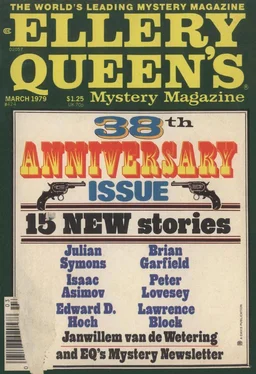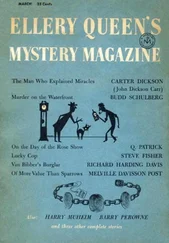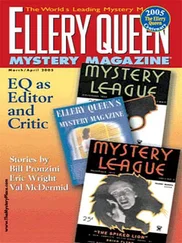Isaac Asimov - Ellery Queen’s Mystery Magazine, Vol. 73, No. 3. Whole No. 424, March 1979
Здесь есть возможность читать онлайн «Isaac Asimov - Ellery Queen’s Mystery Magazine, Vol. 73, No. 3. Whole No. 424, March 1979» весь текст электронной книги совершенно бесплатно (целиком полную версию без сокращений). В некоторых случаях можно слушать аудио, скачать через торрент в формате fb2 и присутствует краткое содержание. Город: New York, Год выпуска: 1979, ISBN: 1979, Издательство: Davis Publications, Жанр: Детектив, на английском языке. Описание произведения, (предисловие) а так же отзывы посетителей доступны на портале библиотеки ЛибКат.
- Название:Ellery Queen’s Mystery Magazine, Vol. 73, No. 3. Whole No. 424, March 1979
- Автор:
- Издательство:Davis Publications
- Жанр:
- Год:1979
- Город:New York
- ISBN:ISSN: 0013-6328
- Рейтинг книги:3 / 5. Голосов: 1
-
Избранное:Добавить в избранное
- Отзывы:
-
Ваша оценка:
- 60
- 1
- 2
- 3
- 4
- 5
Ellery Queen’s Mystery Magazine, Vol. 73, No. 3. Whole No. 424, March 1979: краткое содержание, описание и аннотация
Предлагаем к чтению аннотацию, описание, краткое содержание или предисловие (зависит от того, что написал сам автор книги «Ellery Queen’s Mystery Magazine, Vol. 73, No. 3. Whole No. 424, March 1979»). Если вы не нашли необходимую информацию о книге — напишите в комментариях, мы постараемся отыскать её.
Ellery Queen’s Mystery Magazine, Vol. 73, No. 3. Whole No. 424, March 1979 — читать онлайн бесплатно полную книгу (весь текст) целиком
Ниже представлен текст книги, разбитый по страницам. Система сохранения места последней прочитанной страницы, позволяет с удобством читать онлайн бесплатно книгу «Ellery Queen’s Mystery Magazine, Vol. 73, No. 3. Whole No. 424, March 1979», без необходимости каждый раз заново искать на чём Вы остановились. Поставьте закладку, и сможете в любой момент перейти на страницу, на которой закончили чтение.
Интервал:
Закладка:
Ellery Queen’s Mystery Magazine, Vol. 73, No. 3. Whole No. 424, March 1979

The Deadly Egg
by Janwillem van de Wetering [1] © 1979 by Janwillem van de Wetering.
As of the time of this writing Janwillem van de Wetering has written six novels about the Amsterdam police, featuring Detective Adjutant Grijpstra and Detective Sergeant de Gier. The novels have been highly praised by critics, have sold to eleven foreign publishers, have been serialized and selected by book clubs; a motion picture is now in production in Holland, with the prospect of an American movie soon.
Mr. van de Wetering was born in The Netherlands in 1931. The German bombing of Rotterdam and the subsequent five years of military occupation strongly influenced his early thinking. After graduation from a business college he traveled extensively — Africa, South America, Australia, Japan. He studied philosophy in London and became a disciple of a Zen master in Kyoto, Japan, later writing two books on Zen.
In 1965 he returned to The Netherlands where he became an active member of the Special Constabulary of the Amsterdam Municipal Police (so he knows at first-hand what he’s writing about). He and his family at present live in the United States.
Now, meet for the first time in a short story (but not for the last time, we hope) the most famous pair of detectives in the Criminal Investigation Department (also called the Murder Brigade) of the Municipal Police of Amsterdam — Adjutant Grijpstra and Sergeant de Gier, two of the most human sleuths you have ever encountered in print. The crime they investigate on Easter Day is a fascinating double mystery — “a dead man dangling from a branch in the forest” and “a lady poisoned, presumably by a chocolate Easter egg”...
The siren of the tiny dented Volkswagen shrieked forlornly between the naked trees of the Amsterdam Forest, the city’s largest park, set on its southern edge: several square miles of willows, poplars, and wild growing alders, surrounding ponds and lining paths. The paths were restricted to pedestrians and cyclists, but the Volkswagen had ignored the many No Entry signs, quite legally for the vehicle belonged to the Municipal Police and more especially to its Criminal Investigation Department, or the Murder Brigade. Even so it looked lost and its howl seemed defensive.
It was Easter Sunday and it rained, and the car’s two occupants, Detective Adjutant Grijpstra and Detective Sergeant de Gier, sat hunched in their overcoats, watching the squeaky rusted wipers trying to deal with the steady drizzle. The car should have been junked some years before, but the adjutant had lost the form that would have done away with his aging transport, lost it on purpose and with the sergeant’s consent. They had grown fond of the Volkswagen, of its shabbiness and its ability to melt away in traffic.
But they weren’t fond of the car now. The heater didn’t work, it was cold, and it was early. Not yet nine o’clock on a Sunday is early, especially when the Sunday is Easter. Technically they were both off-duty, but they had been telephoned out of warm beds by Headquarters’ radio room. A dead man dangling from a branch in the forest; please, would they care to have a look at the dead man?
Grijpstra’s stubby index finger silenced the siren. They had followed several miles of winding paths so far and hadn’t come across anything alive except tall blue herons, fishing in the ponds and moats and flapping away slowly when the car came too close for their comfort.
“You know who reported the corpse? I wasn’t awake when the radio room talked to me.”
De Gier had been smoking silently. His handsome head with the perfect curls turned obediently to face his superior. “Yes, a gentleman jogger. He said he jogged right into the body’s feet. Gave him a start. He ran all the way to the nearest telephone booth, phoned headquarters, then headquarters phoned us, and that’s why we are here, I suppose. I am a little asleep myself — we are here, aren’t we?”
They could hear another siren, and another. Two limousines came roaring toward the Volkswagen, and Grijpstra cursed and made the little car turn off the path and slide into a soggy lawn; they could feel its wheel sink into the mud.
The limousines stopped and men poured out of them; the men pushed the Volkswagen back on the path.
“Morning, Adjutant, morning, Sergeant. Where is the corpse?”
“Shouldn’t you know too?”
“No, Adjutant,” several men said simultaneously, “but we thought maybe you know. All we know is that the corpse is in the Amsterdam Forest and that this is the Amsterdam Forest.”
Grijpstra addressed the sergeant. “You know?”
De Gier’s well modulated baritone chanted the instructions. “Turn right after the big pond, right again, then left. Or the other way round. I think I have it right, we should be close.”
The three cars drove about for a few minutes more until they were waved down by a man dressed in what seemed to be long blue underwear. The jogger ran ahead, bouncing energetically, and led them to their destination. The men from the limousines brought out their boxes and suitcases, then cameras clicked and a videorecorder hummed. The corpse hung on and the two detectives watched it hang.
“Neat,” Grijpstra said, “very neat. Don’t you think it is neat?”
The sergeant grunted.
“Here. Brought a folding campstool and some nice new rope, made a perfect noose, slipped it around his neck, kicked the stool. Anything suspicious, gentlemen?”
The men from the limousines said there was not. They had found footprints — the prints of the corpse’s boots. There were no other prints, except the jogger’s. The jogger’s statement was taken, he was thanked and sent on his sporting way. A police ambulance arrived and the corpse was cut loose, examined by doctor and detectives, and carried off. The detectives saluted the corpse quietly by inclining their heads.
“In his sixties,” the sergeant said, “well dressed in old but expensive clothes. Clean shirt. Tie. Short gray beard, clipped. Man who took care of himself. A faint smell of liquor — he must have had a few to give him courage. Absolutely nothing in his pockets. I looked in the collar of his shirt — no laundry mark. He went to some trouble to be nameless. Maybe something will turn up when they strip him at the mortuary; we should phone in an hour’s time.”
Grijpstra looked hopeful. “Suicide?”
“I would think so. Came here by himself, no traces of anybody else. No signs of a struggle. The man knew what he wanted to do, and did it, all by himself. But he didn’t leave a note; that wasn’t very thoughtful.”
“Right,” Grijpstra said, “time for breakfast, Sergeant! We’ll have it at the airport — that’s close and convenient. We can show our police cards and get through the customs’ barrier; the restaurant on the far side is better than the coffee shop on the near side.”
De Gier activated the radio when they got back to the car.
“Male corpse, balding but with short gray beard. Dentures. Blue eyes. Sixty-odd years old. Three-piece blue suit, elegant dark gray overcoat, no hat. No identification.”
“Thank you,” the radio said.
“Looks very much like suicide. Do you have any missing persons of that description in your files?”
“No, not so far.”
“We’ll be off for breakfast and will call in again on our way back.”
Читать дальшеИнтервал:
Закладка:
Похожие книги на «Ellery Queen’s Mystery Magazine, Vol. 73, No. 3. Whole No. 424, March 1979»
Представляем Вашему вниманию похожие книги на «Ellery Queen’s Mystery Magazine, Vol. 73, No. 3. Whole No. 424, March 1979» списком для выбора. Мы отобрали схожую по названию и смыслу литературу в надежде предоставить читателям больше вариантов отыскать новые, интересные, ещё непрочитанные произведения.
Обсуждение, отзывы о книге «Ellery Queen’s Mystery Magazine, Vol. 73, No. 3. Whole No. 424, March 1979» и просто собственные мнения читателей. Оставьте ваши комментарии, напишите, что Вы думаете о произведении, его смысле или главных героях. Укажите что конкретно понравилось, а что нет, и почему Вы так считаете.












